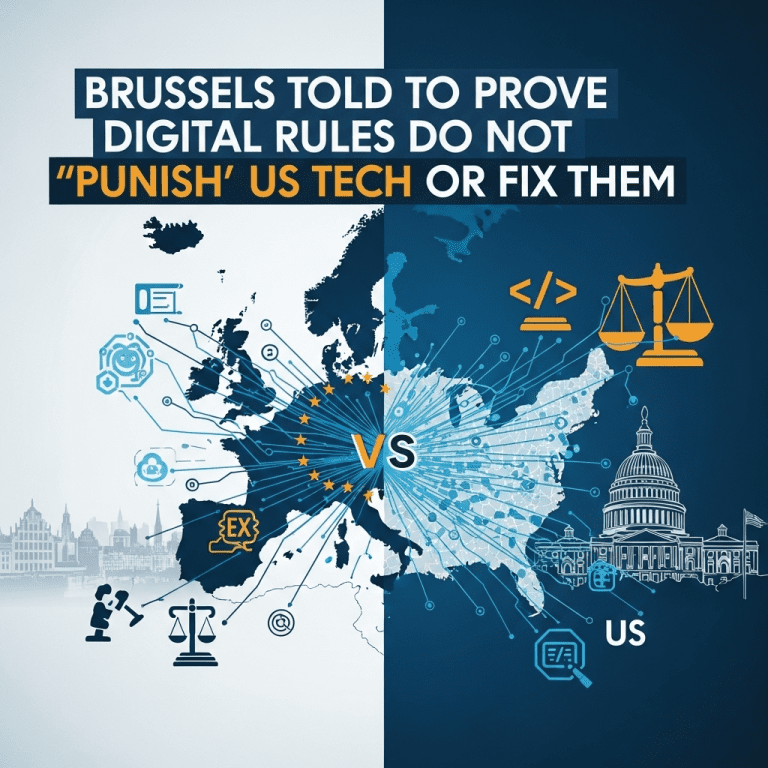In a pivotal move affecting the future of the global digital economy, Brussels told to prove digital rules do not ‘punish’ US tech or fix them, spurring intense debate across economic and political spheres. This challenge highlights the mounting tension around the European Union’s ever-evolving approach to digital regulation and its far-reaching impact on transatlantic trade, investment, and innovation.
Brussels Told to Prove Digital Rules Do Not ‘Punish’ US Tech or Fix Them: Understanding the Controversy
At the center of this controversy lie the Digital Markets Act (DMA) and Digital Services Act (DSA), sweeping new EU rules targeting “gatekeepers”—primarily US-based multinational tech companies. The US government and industry leaders have expressed concerns that these digital regulations disproportionately target American firms, calling on Brussels to justify their neutrality or amend the legislation to ensure fair competition.
Tech companies, trade bodies, and investment analysts have voiced fears that the rules could create an uneven playing field while stifling innovation. EU officials, meanwhile, argue that the framework is essential for protecting consumer choice, bolstering competition, and enhancing data privacy.
Navigating Economic Consequences of Digital Regulation
The demand that Brussels told to prove digital rules do not ‘punish’ US tech or fix them reflects broader economic concerns about investment flows, digital trade barriers, and potential retaliation. The DMA and DSA seek to rein in the power of global tech platforms by enforcing stricter transparency, content moderation, and interoperability requirements—rules that mainly affect US-based giants such as Apple, Google, Meta, and Amazon.
Analysts predict that if the EU cannot demonstrate the neutrality and proportionality of its measures, new trade disputes and regulatory fragmentation could follow in 2025. American and European business leaders alike worry about market fragmentation, increased compliance costs, and hampered cross-border collaboration, potentially shifting tech investment away from the EU.
The Transatlantic Response: Cooperation or Confrontation?
In response to the challenge, Brussels now faces the delicate task of providing compelling evidence that the digital rules do not single out US companies, or alternatively, adjusting them to avoid discriminatory outcomes. US officials have signaled that failure to address these concerns could complicate ongoing transatlantic trade negotiations and disrupt longstanding economic ties.
Observers suggest that a diplomatic and evidence-driven solution is required, emphasizing that regulatory alignment is crucial for sustainable growth in digital markets. Many EU policymakers recognize that ensuring a fair, innovative, and investor-friendly landscape is essential to remain globally competitive.
Key Arguments: Market Fairness vs. Economic Protectionism
The heart of the debate revolves around market fairness versus accusations of economic protectionism. Proponents of EU digital regulation argue that the DMA and DSA impose reasonable constraints to counter excessive market dominance, thereby protecting consumers and smaller competitors.
Critics, on the other hand, maintain that regulations may inadvertently—or deliberately—erect barriers to entry for foreign companies, particularly those headquartered in the US. Concerns also linger regarding the potential ripple effects for related sectors, such as cloud infrastructure, online advertising, and app distribution.
Global Implications: Setting the Tone for Digital Commerce
The outcome of this challenge will shape not only EU-US digital relations but also global technology standards. Newly implemented rules could serve as a blueprint for other jurisdictions or exacerbate international policy divergence—a trend already observed in data protection and digital tax debates.
For international investors and multinational corporates, the clarity and fairness of EU digital regulation remain critical. According to leading voices in economic think tanks such as ThinkInvest, uncertainty around the regulatory environment risks reducing capital inflows and technological collaboration throughout Europe.
Looking Forward: What’s at Stake for the Digital Economy?
As Brussels faces mounting pressure, the stakes extend far beyond tech giants. Small and medium-sized enterprises (SMEs), developers, and consumers also stand to benefit—or suffer—from upcoming regulatory shifts. Finding a balanced solution is key to ensuring Europe remains a prime destination for tech investment and digital innovation.
Ongoing stakeholder consultations, impact assessments, and dialogue with transatlantic partners are expected to intensify throughout 2025. Business networks and policy think tanks continue to advocate for regulations that are not only technologically adaptable but also globally compatible and non-discriminatory.
Ultimately, this moment marks a significant crossroads for the EU digital economy. Whether Brussels told to prove digital rules do not ‘punish’ US tech or fix them results in regulatory recalibration or entrenched positions will have profound implications for the pace of digital transformation, innovation leadership, and long-term economic competitiveness.
Stay Informed on Evolving Technology Regulation
For the latest insights into digital policy shifts, regulatory trends, and strategic investment analysis, visit ThinkInvest—a leading source of unbiased research in the fast-moving economy. As policymakers and industry leaders grapple with these challenges, staying informed is critical for digital businesses and investors alike.









